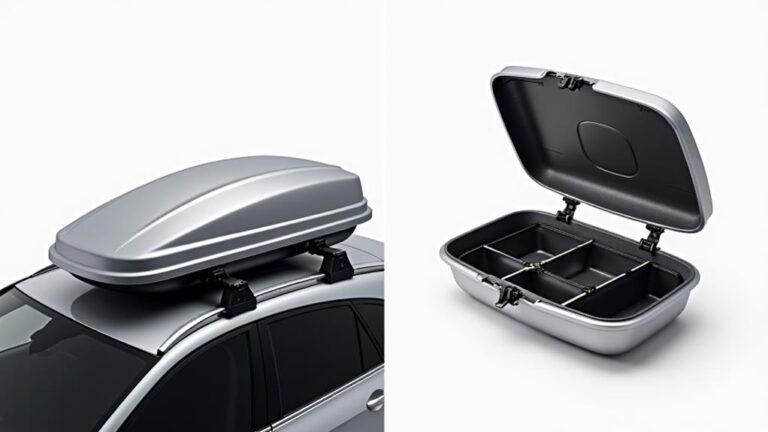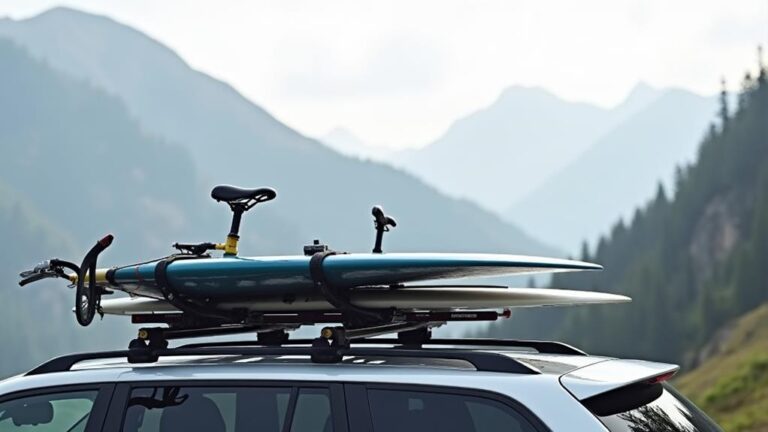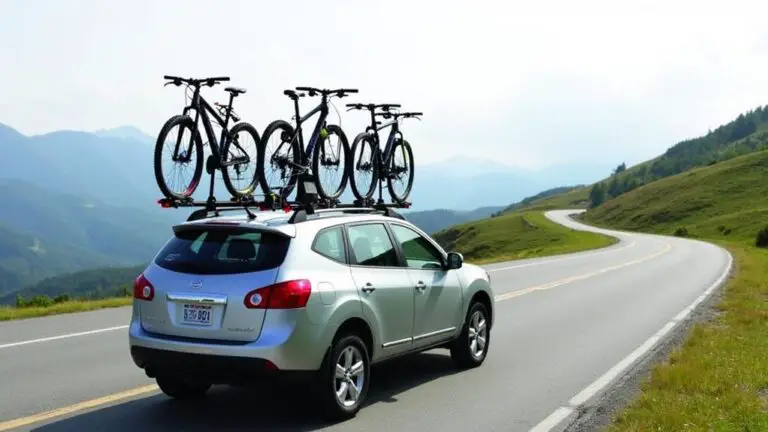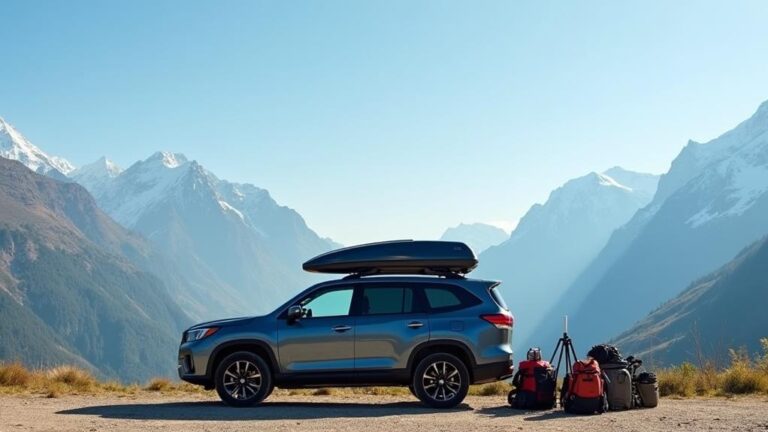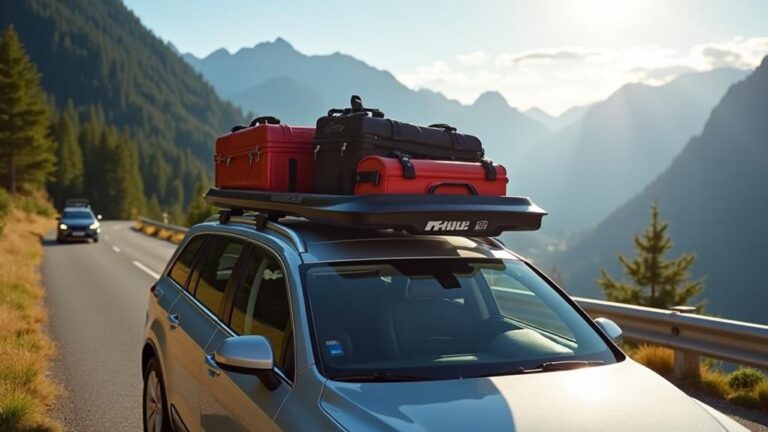As you consider adding a rooftop tent to your vehicle, it’s essential to ask yourself if your car is up for the task. Not all vehicles are created equal when it comes to supporting the weight and demands of a rooftop tent. You’ll need a car with a sturdy roof, adequate roof rack or mounting points, and sufficient weight capacity to handle the added load. But that’s just the beginning – there are several other factors to consider before making a decision. Can your vehicle handle the extra weight, and what are the potential risks if it can’t?
Key Takeaways
- A sturdy roof and roof rack system are essential for supporting the weight of a rooftop tent and its occupants.
- Not all vehicles are compatible with rooftop tents, especially those with low ground clearance or weak roof structures.
- The vehicle’s weight capacity, wheelbase, and center of gravity must be considered for tent stability and vehicle balance.
- Weight limits and load capacity ratings must be checked to avoid exceeding the vehicle’s roof capacity and compromising safety.
- Consultation with the vehicle manufacturer and rooftop tent manufacturer is necessary to determine compatibility and ensure a safe installation.
Choosing the Right Vehicle
When it comes to installing a rooftop tent, not all vehicles are created equal.
You’ll want to consider car features that make it suitable for off-road adventures and rooftop tent installation. Look for vehicles with a sturdy roof that can support the weight of the tent and occupants.
A vehicle with a roof rack system or mounting points for a rack is ideal, as it provides a secure base for the tent.
Off-road readiness is also crucial, especially if you plan to take your vehicle on rugged terrain.
A four-wheel drive (4WD) or all-wheel drive (AWD) system can provide the necessary traction and stability. High ground clearance and a robust suspension system can also help navigate rough terrain.
Additionally, consider the vehicle’s weight capacity, wheelbase, and center of gravity, as these factors can affect the tent’s stability and the vehicle’s overall balance.
Rooftop Tent Compatibility Factors
When selecting a rooftop tent, you must consider several compatibility factors to ensure a safe and stable installation.
First, you need to check the tent’s weight limits, as exceeding these limits can lead to structural damage or even collapse.
Additionally, you’ll need to assess your vehicle’s roof type, as some rooftop tents require specific roof rack systems or attachment points to function properly.
Tent Weight Limits
How much weight can your car’s roof support – a crucial factor in determining rooftop tent compatibility.
You’ll need to consider the tent’s weight, including the tent fabric, frame, poles, and any additional features.
The load capacity ratings of your car’s roof will also play a significant role in this assessment.
Load capacity ratings, usually specified by the vehicle manufacturer, indicate the maximum weight your car’s roof can safely support.
These ratings often include a dynamic load capacity for driving conditions and a static load capacity for stationary conditions.
When selecting a rooftop tent, ensure its weight, including occupants and gear, stays within these specified limits.
Tent weight distribution is another critical consideration.
A well-distributed load is essential to prevent excessive stress on any single point of the roof.
Look for rooftop tents with a low center of gravity and a wide, even weight distribution to minimize the risk of damage or collapse.
By carefully evaluating your car’s load capacity ratings and the tent’s weight distribution, you can ensure a safe and compatible rooftop tent setup.
Always consult your vehicle’s manual and manufacturer recommendations for specific guidance on rooftop tent compatibility.
Vehicle Roof Type
Considering your car’s roof type is essential in determining rooftop tent compatibility, as different roof designs and materials can affect the tent’s stability and security.
You need to know whether your vehicle has a soft top or hard top to ensure the rooftop tent is properly secured.
Soft tops, typically found on convertibles or vehicles with fabric roofs, may not provide a stable base for a rooftop tent.
The fabric material is often not strong enough to support the weight of the tent, and the lack of a solid frame can compromise the tent’s structural integrity.
In contrast, hard tops, usually found on SUVs, trucks, and sedans, offer a more solid foundation for rooftop tents.
Hard tops made of metal or fiberglass provide a sturdy base for the tent, allowing for secure attachment and minimizing the risk of damage or collapse.
When evaluating your vehicle’s roof type, check the manufacturer’s specifications to determine the roof’s material, thickness, and weight capacity.
This information will help you choose a rooftop tent that’s compatible with your vehicle and ensure a safe and secure camping experience.
Vehicle Weight and Capacity
You’ll need to factor in your vehicle’s weight and capacity when shopping for a rooftop tent, as these factors directly impact the compatibility and safety of the setup.
Your vehicle’s payload ratings, which include Gross Vehicle Weight Rating (GVWR) and Gross Axle Weight Rating (GAWR), are crucial in determining the maximum weight it can safely carry. Payload ratings include the weight of the vehicle itself, occupants, cargo, and any additional equipment, such as a rooftop tent.
To ensure a safe and compatible setup, you’ll need to calculate the weight of your rooftop tent, including the tent itself, bedding, and occupants.
Compare this weight to your vehicle’s payload ratings to ensure you’re within the recommended limits. Additionally, consider your vehicle’s axle weights, as an uneven distribution of weight can lead to compromised safety and stability.
Make sure to consult your vehicle’s owner’s manual or manufacturer’s specifications to determine the exact payload ratings and axle weights for your particular vehicle.
Roof Rack and Bar Systems
With your vehicle’s weight and capacity taken into account, it’s time to focus on the roof rack and bar systems that will support your rooftop tent.
The roof rack system you choose must be compatible with your vehicle’s make and model, taking into account its roof topography. This includes the shape and size of the roof, as well as any existing features such as rails or gutters.
When selecting a roof rack system, consider the load distribution of your rooftop tent.
The tent’s weight should be evenly distributed across the roof rack to prevent any damage to your vehicle or the tent itself. Look for a roof rack system that has a dynamic weight capacity that matches or exceeds the weight of your tent. Dynamic weight capacity refers to the weight the roof rack can handle while the vehicle is in motion.
A good roof rack and bar system should also provide a sturdy and stable platform for your rooftop tent.
Look for systems with adjustable bars and a secure attachment system to ensure a snug and level fit. By choosing the right roof rack and bar system, you can ensure a safe and secure installation of your rooftop tent.
Tent Size and Style Considerations
When selecting a rooftop tent, you must consider the size and style to ensure compatibility with your vehicle.
The weight of the tent impacts your vehicle’s overall weight distribution and roof load capacity, so it’s crucial to calculate the total weight, including occupants, gear, and the tent itself.
Additionally, you’ll need to factor in vehicle clearance requirements, including height, width, and roof shape, to ensure the tent doesn’t obstruct doors, windows, or other features.
Tent Weight Impact
Considering the dynamics of rooftop tent installation, the weight of the tent significantly impacts its compatibility and stability on various vehicles.
You need to carefully assess the weight of your rooftop tent to ensure it’s compatible with your vehicle. The weight of the tent is influenced by its size, style, and material. For instance, a larger tent made of heavy-duty materials will be heavier than a smaller, more compact one made of lightweight materials.
When evaluating the weight of a rooftop tent, you should also consider its load distribution. A well-designed tent will have an even load distribution, ensuring the weight is spread evenly across the roof of your vehicle.
This is crucial to prevent overloading certain areas of the roof, which can lead to structural damage or collapse. Look for a tent with a sturdy frame and a durable, water-resistant material that provides a stable platform for your camping needs. Additionally, be sure to check the weight capacity of your vehicle’s roof rack to ensure it can support the weight of the tent and its occupants.
Vehicle Clearance Requirements
Your rooftop tent’s weight compatibility is just one aspect of the overall installation process. When choosing a rooftop tent, you must also consider the vehicle clearance requirements.
Clearance measurements are crucial to ensure a proper fit and avoid any potential issues.
Start by measuring your vehicle’s roof rack to determine the maximum size of the rooftop tent you can install.
You should also check the tent’s height when folded and when open to ensure it won’t obstruct your vehicle’s sunroof or hatchback. Additionally, consider the vehicle’s ground clearance to avoid any potential ground clearance issues.
A rooftop tent that’s too large can reduce your vehicle’s ground clearance, making it more susceptible to scraping or damage on uneven terrain.
To avoid these issues, choose a rooftop tent that’s specifically designed for your vehicle’s make and model.
Alternatively, consult with a rooftop tent manufacturer or a professional installer to determine the best tent size and style for your vehicle.
Installation and Mounting Options
Mounting a rooftop tent on your car requires careful consideration of the vehicle’s roof structure and the type of installation method used.
You’ll need to choose a mounting system that’s compatible with your vehicle’s make and model. There are several types of mounting systems available, including clamping systems, fixed point systems, and track-based systems.
Tent clamping systems involve attaching clamps to the roof rack or roof bars to secure the tent.
These systems are relatively easy to install and can be adjusted to fit different roof bar sizes. However, they may not be suitable for all types of roof structures, such as those with a roof spoiler or wind deflector.
Track-based systems, on the other hand, offer more flexibility and can be installed on a wide range of vehicles.
These systems involve attaching a track to the roof of the car, which the tent then attaches to.
This type of system provides a secure and stable base for the tent and can be adjusted to accommodate different tent sizes.
It’s essential to consult your vehicle’s manual and the manufacturer’s instructions to determine the best mounting system for your car.
Safety and Structural Integrity
When a rooftop tent is installed on a vehicle, it imposes additional stress on the roof structure, potentially compromising its safety and structural integrity.
You must consider the weight and load distribution of the tent, as well as the vehicle’s roof capacity, to ensure a safe and secure installation.
Crash tests have shown that a rooftop tent can affect a vehicle’s crashworthiness, particularly if the tent isn’t properly secured or if the roof structure isn’t designed to support the added weight.
To ensure the safety and structural integrity of your vehicle, consider the following factors:
- The weight and size of the rooftop tent in relation to the vehicle’s roof capacity
- The load distribution of the tent, including the weight of occupants, gear, and wind resistance
- The type of roof structure, including the material, thickness, and reinforcement, to determine its ability to support the added weight
You should consult with the vehicle manufacturer and the rooftop tent manufacturer to determine the compatibility of the tent with your vehicle, and to ensure that it’s installed correctly.
Frequently Asked Questions
Can a Rooftop Tent Damage My Vehicle’s Paint Job?
When installing a rooftop tent, you risk damaging your vehicle’s paint job if not done correctly. Consider applying paint protection film or exploring coating options to safeguard against scratches, dings, and fading.
How Often Should I Inspect My Rooftop Tent?
When it’s time for tent maintenance, you’ll want to inspect your rooftop tent regularly, ideally before and after each use, and perform seasonal checks to ensure its structural integrity and waterproofing remain uncompromised.
Are Rooftop Tents Suitable for Extreme Weather Conditions?
You’ll encounter 70mph gusts in severe storms. When facing such conditions, rooftop tents can withstand snow conditions and high wind resistance, but it’s crucial to secure them with reinforced anchors and follow manufacturer guidelines.
Can I Leave a Rooftop Tent Installed Year-Round?
You can leave a rooftop tent installed year-round, but consider rooftop storage and tent security. Regularly inspect and maintain the tent, its attachments, and your vehicle’s roof to ensure a safe and secure installation.
Do Rooftop Tents Void a Vehicle’s Warranty?
You’ll find 95% of rooftop tent installations are warranty-compliant. Before installing, you should perform warranty checks and review your vehicle’s manufacturer policies to ensure compliance, as some may have specific requirements or restrictions.
Conclusion
You’ve likely heard of the disastrous outcome of a hasty rooftop tent installation – like the driver whose tent flew off on the highway, causing a multi-car pileup. Don’t let this be you. With the wrong vehicle or setup, a rooftop tent can be a recipe for disaster. To avoid this, choose a vehicle with a sturdy roof, suitable weight capacity, and compatible roof rack system. Always consult your vehicle’s manual and manufacturer’s instructions for safe and secure installation.



